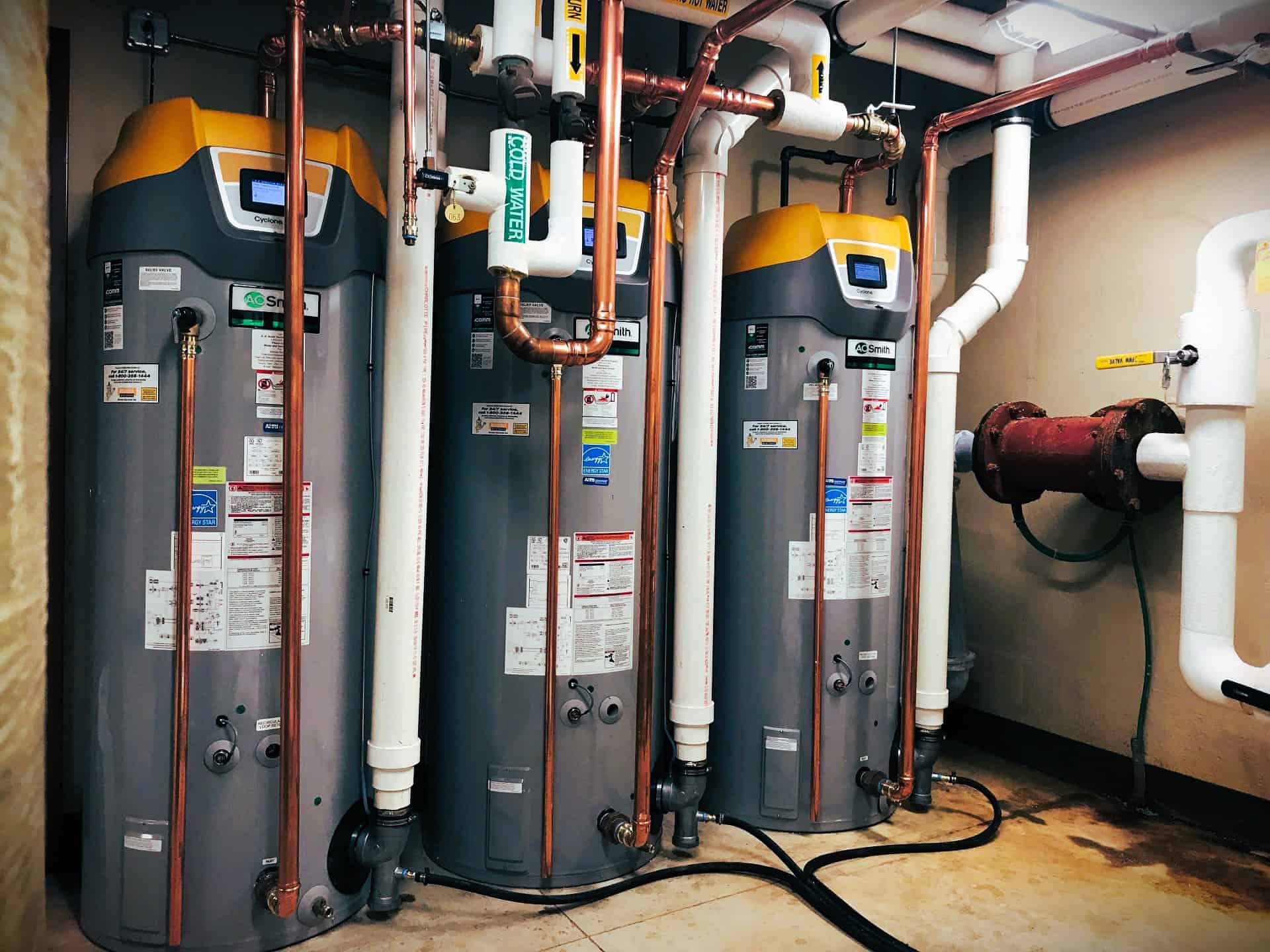How great would it be if your business never experienced downtime due to a broken water heater?
With a redundant water heater system, that could be your reality! So, what does it mean to have redundancy in your hot water system? No, we’re not talking about the phrase “hot water heater,” though that’s definitely an example of redundancy! In this case, water heater “redundancy” means having a backup water heater in place that is configured to work automatically in case one (or more) of your other water heaters fail.
Redundant water heaters are a good idea for any company that relies on steady hot water to keep their customers happy or their doors open for business. In industries like senior care or food manufacturing, having access to constant hot water for health, safety, sanitation, and cooking is essential, meaning that the water heater system redundancy is practically mandatory to keep daily operations up and running!
And sure, in a hotel, restaurant, or apartment building, you can survive with only cold water for a few hours without losing customers or tenants. If you’ve got a water heater rental plan when that water heater goes down, you can count on fast, reliable water heater service, so your water heater woes won’t be quite so burdensome.
However, with multiple heaters set up to provide hot water redundancy, you’ll never have to worry about closing your kitchen, losing production time, or the wrong person finding out about your water heater failure. Your backup water heater will be there to pick up the slack while you wait for a trained water heater technician to arrive and fix your broken equipment.
Redundant Water Heaters: Equipment & Setup
The redundant water heater setup is broken down into two categories: cascade systems and balanced systems.

Balanced System
In a balanced system, all water heaters work together simultaneously to heat water at a much lower setting than their maximum capacities. Because your backup heaters are active at the same time, there is far less strain on the units overall, reducing the likelihood of any unit burning itself out.
Cascade System
In a cascade system, one water heater or a set of heaters (depending on the needs of the business) does the work of heating water most of the time. The additional (redundant) heater/s only kicks in and becomes part of the system when the main water heater/s malfunctions.
It’s worth noting that technology has made cascade systems rather obsolete, so they’re not the best option for most high-volume commercial applications. Most modern systems operate on “rotating demand,” meaning the run time for each heater is relatively even, so no one heater is working more than the other(s). When considering your ideal water heating system, a balanced system is the most reliable option for your equipment.
What Else Should I Know About Backup Water Heater Setups?
In either configuration, but especially in a cascade system, keeping a close eye on the water heaters to ensure they work properly is essential. Because redundant water heaters are meant to provide an automatic backup, it’s possible for a business owner or maintenance person to miss that anything is wrong until the redundant heater/s also experiences problems.
Remember: Regular water heater preventative maintenance is vital.
Let’s take a cascade system with four total water heaters as an example: In this setup, there are two main heaters and two redundant heaters. The business usually relies on two heaters to meet their needs. If one main hot water heater fails, a third one will kick on automatically with no problems. The fourth water heater can kick on if the second main heater fails, but the redundancy is gone.
The takeaway: if no one makes a point to check on your water heater setup regularly, you may not know anything is wrong until something happens to that third heater. That could take a long time, and it could be too late by then!
For this and other reasons, we don’t usually recommend a cascade system for a commercial water heater setup. When you put all the burden of producing hot water on one water heater while the others sit there dormant, you’re more likely to experience water heater failure quickly and often. A balanced system is a better option for a commercial application, to lighten the load for each heater and maintain optimal commercial water heater redundancy.
So, while a redundant system can help ensure that your hot water never goes out entirely, it’s only as good as your ability to keep an eye on your equipment. It doesn’t have to take more than a few moments to check – just long enough to be sure the temperature readings are correct and that none of the units exhibit any early signs of water heater failure.
Water Heater Maintenance Schedule
Ensuring that your water heaters are working well is always good and doesn’t have to be complicated. Here is a list of recommended routine maintenance that you can implement into your day-to-day business operations to keep you in the clear:
Twice Per Year
- Visual inspection to check for leaks, rust, loose screws, pooling water, corrosion, mechanical failures, and aging gaskets
- Flush the heater with clean water to remove debris, sediment, or hard water buildup.
- Check the T&P valve, a.k.a. the pressure release valve. You should have a professional perform this inspection. Using a technician trained in this field is essential because a faulty T&P valve can lead to water heater explosions!
- Have a trained technician check the heat source, hot water tank, temperature controllers, gas valve, and return pumps to ensure they function correctly.
Every Three To Five Years
Replace the anode rod. This small metal rod is kept on top of the storage tank and helps prevent corrosion by attracting the elements that cause it! This is also commonly referred to as a sacrificial anode rod, because the corrosive elements will eat away at the softer metals in the anode rod before they eat away at the stronger metal of the water heater tank. But once the anode rod has been consumed the water heater tank is the next target, so it’s important to check these, and replace them when they have disintegrated.
Double Your Luck: Do I Need A Backup Water Heater (Or Two)?

To achieve 100% redundancy, you want a backup heater big enough to cover your maximum capacity requirements. However, there’s a difference between being entirely covered by redundancy and having a backup water heater that lets you “limp along” until your first heater can be fixed.
Depending on your business needs, a 50% level of redundancy might give you enough water to meet your needs temporarily; in this case, you’ll need your backup water heaters to cover most of your hot water capacity requirements.
If you can’t be completely redundant due to budget or space limitations in your boiler room, then “limping along” is a great option to ensure you have some hot water while you wait for a commercial water heater technician to repair your water heater.
Here’s an example scenario: If your business needs 120 gallons of hot water per hour, we might recommend installing two smaller heaters, such as 80-gallon units with sufficient BTUs to generate your hourly requirement, instead of one larger standard water heater to accomplish the same. This built-in redundancy means that if the first heater fails, you’ll still have enough hot water to keep afloat. Even if you won’t be at 100% capacity until that second 80-gallon water heater is repaired or replaced. (Confused about water heater sizing? You can learn more about hot water requirements and water heater sizing here.)
At Reliable Water Services, our 24/7 water heater repair response times are FAST, but we still haven’t mastered teleportation! (We’re working on it.)
If you have enough space, redundancy is a no-brainer for commercial water heaters. With everything you must accomplish daily, water heater redundancy is the best way to bring peace of mind to one of the many components of running a business that can have severe consequences if things go wrong. A redundant system may come with extra installation costs, but the additional savings you’ll rack up in the long run will be well worth it when you don’t have to close your doors for inconvenient repairs!
Free yourself from the worry of water heater failure and call Reliable Water Services to ask about installing redundant water heaters! Not enough footprint for redundancy? All the more reason to explore your options with RWS today!